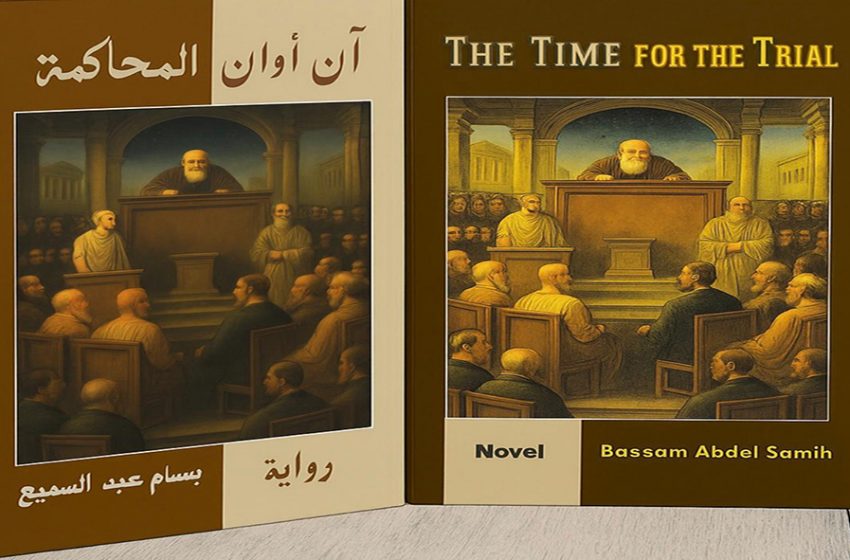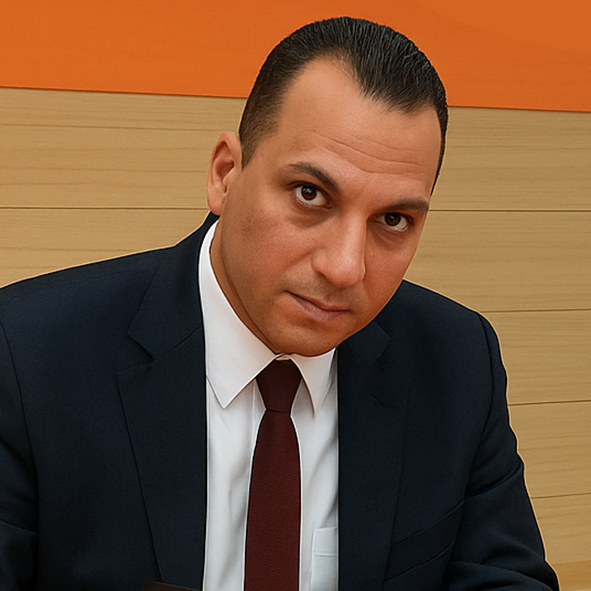Egyptian Author and Journalist Bassam Abdel-Samiea Presents “The Time for the Trial” — A Philosophical Courtroom Where No Idea Is Sacred and No One Is Immune.

Cairo, Egypt – 15 October 2025

Egyptian author and journalist Bassam Abdel-Samiea unveils his groundbreaking new novel, “The Time for the Trial”, now available in both Arabic and English on Amazon. The novel transforms philosophy into drama, bringing together thirty philosophers spanning three millennia — from Plato and Kant to modern thinkers — in a single cosmic courtroom where humanity itself stands trial.
In an exclusive interview with Dr. Jamal Al-Majaida, Abdel-Samiea describes the book as “a cry that awakens the reader before even turning the first page.” He explains that “The Time for the Trial” is not just a work of fiction, but a moral and intellectual reckoning — a universal tribunal where inherited dogmas and unquestioned certainties face critical examination.
“This trial is not about people, but about ideas,” Abdel-Samiea says. “Every reader becomes both witness and judge, standing before the mirror of conscience. The courtroom is inside each of us.”
A Novel That Fuses Philosophy, Literature, and Investigative Thought
Structured as a rising theatrical performance, “The Time for the Trial” alternates between philosophical dialogue and dramatic tension. The courtroom setting becomes a metaphor for life itself, where ancient wisdom and modern anxieties collide — from Aristotle’s logic to questions of artificial intelligence, digital implants, and the ethics of organ transfer.
The work introduces a new intellectual movement Abdel-Samiea calls “Mosaic Philosophy” — an approach that embraces contradictions as paths to truth rather than obstacles.
“Contradictory ideas are not enemies,” he explains. “They are pieces of a mosaic that complete one another. Every certainty is just a deferred question, and doubt is not betrayal — it is maturity.”
Elon Musk: The Philosopher of the Future
Among the novel’s unexpected characters is Elon Musk, portrayed not as a celebrity but as a symbol of the modern philosopher-engineer — one who straddles the line between creation and domination.
“Musk represents the rebellious human mind that lives between the possible and the impossible,” says Abdel-Samiea. “His presence raises timeless questions: Has technology become a new religion? Does innovation lead to freedom — or to a golden cage?”
He even envisions a “Future Prize,” inspired by Musk — an annual award for creators who dare to shape tomorrow rather than wait for it.
Justice, Doubt, and the Courage to Reflect
The novel’s central theme is justice — not as a legal concept, but as a living moral act tested by conscience. “Justice is complete only when it passes through the human soul,” Abdel-Samiea says.
He challenges readers to question whether their pursuit of justice serves humanity or merely themselves.
“Every reader who opens this book begins a new session of the trial,” he notes. “This novel will not save you — it will look you in the eye and whisper: the trial has begun.”
Between Reality and Reflection
Abdel-Samiea’s text blends philosophical inquiry with the techniques of investigative journalism, transforming ideas into evidence and reality into testimony. The novel’s characters — from Buddha to Fukuyama — are not treated as historical icons but as living ideas confronting the modern reader.
“Any idea, no matter how noble, becomes dangerous once it turns into a golden cage that forbids questioning,” he warns. “Faith itself is not under trial — but the misuse of faith is.”
A Journey Through Thought and Time
Throughout his career, Abdel-Samiea has bridged journalism and literature, earning recognition for his bold intellectual exploration. His previous works include “The Exceptional Hajj”, “Traveler in the Time of Prohibition”, “Cry of 2020”, “Regaining the Self”, “The State of Robots”, and “The Sin of a Lifetime.”
He has received multiple awards, including the Arab Journalism Award (2017), the Dubai Award for Journalistic Creativity (2006), and recognition from the UNHCR for his cultural reporting.
“The Time for the Trial” is his most ambitious work yet — a mirror that compels every reader to confront themselves, their beliefs, and the ideas that shape their world.

















